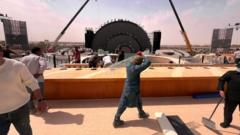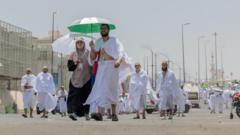Reports from Human Rights Watch and FairSquare suggest that the construction preparations for the event are linked to a disturbing increase in preventable deaths among laborers, raising ethical and safety concerns.
Surge in Migrant Worker Deaths Raised Ahead of Saudi World Cup 2034

Surge in Migrant Worker Deaths Raised Ahead of Saudi World Cup 2034
Human rights groups issue alarming warnings regarding rising fatalities among migrant workers in Saudi Arabia as the nation gears up for the 2034 World Cup.
Human rights organizations are sounding the alarm over what they describe as a "surge" in fatalities among migrant construction workers in Saudi Arabia, coinciding with the nation’s ambitious plans to host the World Cup in 2034. Both Human Rights Watch and FairSquare have released reports asserting that expectable workplace accidents are increasingly causing these deaths, many of which are incorrectly classified as natural causes, thereby leaving families without compensation.
"The upcoming 2034 Saudi World Cup represents an unprecedented financial investment, but it risks becoming a tragic chapter marked by extensive loss of life among migrant workers," said Minky Worden, director of Global Initiatives at Human Rights Watch, noting the considerable infrastructure development required, including construction of 11 stadiums and significant upgrades to public transport.
This warning comes in the wake of a high-profile visit by FIFA President Gianni Infantino and former President Donald Trump to an investment forum in Saudi Arabia. Despite FIFA's assertion of a commitment to human rights, Human Rights Watch accuses the organization of neglecting lessons learned from previous migrant worker tragedies leading up to the 2022 World Cup in Qatar.
The precise extent of migrant worker deaths remains difficult to ascertain in Saudi Arabia, where human rights activists have limited access and labor unions are non-existent. Reports gathered by Human Rights Watch from the families of 31 affected workers revealed harrowing tales of fatal accidents involving falls, heavy machinery, and electrocution.
With construction activity ramping up, concerns over worker heat exposure have also entered discussions. In March, a Pakistani foreman tragically lost his life while working on a stadium site in Al Khobar, marking the first reported death linked to World Cup preparations.
Despite claims by the Saudi government of improvements in occupational health and safety over recent years, labor organizations remain skeptical. The general secretary of the global construction workers’ union, BWI, indicated an "alarming rise" in preventable accidents attributed to systemic negligence and insufficient oversight.
Moreover, FairSquare's report highlights that Saudi medical authorities rarely perform autopsies to determine the causes of migrant workers' deaths, leaving families in the dark about the circumstances of their loss. "Hundreds of thousands of young men are tragically thrust into a hazardous labor system, a medical infrastructure ill-equipped to investigate their deaths, and a political environment devoid of protection," the report states.
While FIFA pledged to implement a workers' welfare system with enforceable standards for World Cup-related construction, no specifics were provided on its operation. The organization stated, "We believe that the measures taken to ensure the rights of construction workers can elevate standards for worker protection in Saudi Arabia."
Human Rights Watch insists that all migrant worker deaths must be thoroughly investigated, regardless of the perceived cause, and that affected families should be treated with dignity and compensated adequately. The BBC has sought comments from Saudi officials regarding these pressing concerns.




















